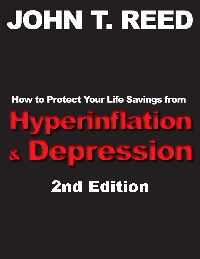Chase letter ending international wire transfers and transactions exceeding $50,000 a month
Posted by John Reed on
Copyright 2013 John T. Reed
A number of readers sent me an Infowars article containing a letter from Chase bank to some business customers telling them that after 11/17/13, they would no be able to send international wire transfers or have transactions exceeding $50,000 per month.
Two of my readers who sent me this, warned that Infowars has a reputation for unreliability.
I promised to look into it, although I told my readers who said this was the capital controls I have been warning about that it was not because capital controls are solely the province of the federal government.

So here’s the real deal.
Roughly speaking, Chase had a one-size fits all business account. It allowed international wire transfers and unlimited transactions. Plus it had a minimum balance. In order to offer such a wide variety of services, the minimum balance had to be higher.
Chase decided it would be better to have two types of business accounts: one for big-time businesses and one for small-time businesses. They have different names for them. I don’t care about that.
The new big-time account allows international wire transfers and unlimited transactions and has a relatively high minimum balance requirement. The new small-time account does not allow the wires or more than $50,000 in monthly transactions, but it has a lower minimum-balance requirement.
So Chase has not ended the services or restricted all of its business customers to $50,000 a month. It has simply said you need the new, big-time account to do those things.
Now let’s talk about the bigger picture.
This was a non-story that should not have been reported in any medium.
There is clearly a mistrust-America-first bunch of paranoiacs out there. They are extremely eager to believe that Chase is preventing you from getting your money out of the US or even out of Chase.
They also typically believe things like Cyprus confiscated depositors money, FDR confiscated gold, the bar codes on IRS tax return forms are some dark conspiracy manifestation.
If you are one of these people, you need to get your head straightened out. There is a new academic discipline called behavioral economics or behavioral finance. I wrote a chapter about it in my book Best Practices for the Intelligent Real Estate Investor. It is the study of why many if not most people make illogical, self-destructive decisions when it comes to money. They have identified dozens of what they call “biases,” what sports writers would call “holes in your game.”
If you have holes in your game, you need to get rid of them. Pouncing on and believing every rumor that the government or Wall Street is stealing from you or spying on you is nutty and acting on such notions will hurt you.
That is not to say that the government and Wall Street are incapable of doing such things, but there is a little more morality and rule of law than these paranoiacs seem to think.
Capital controls
A number of readers said the Chase letter is the capital controls I predicted.
No, it isn’t.
Capital controls can only be imposed by the federal government. I assure you they will impose them when the money starts to rush out of the country. Government is scum and they will do whatever sleaze they think they need to do to protect their own interests. But the U.S. government has not yet imposed capital controls. And no bank, Chase or otherwise, can impose capital controls on their own. Nor would they. Their customers who care about such things would all leave within days.
Forex and bond markets
Before I learned that this only applied to some Chase accounts, I thought it was just Chase trying to manage the risks of a U.S. bond default and possible temporary run on the dollar.
It was not because it will not apply to all Chase customers, just some small-business customers who rarely use international wire transfers or do more than $50,000 a month in bank transactions.
Unless Chase, and only Chase, is in danger of failing, it will take no unilateral actions that restrict what any of its customers can do with their money. And in that event, all FDIC-insured depositors would be protected by the FDIC.
My wife was an FDIC bank examiner for many years. She closed many banks—always on Friday afternoons—and those banks always opened on Monday morning at the normal business hours time either as FDIC savings bank or with another bank name due to a merger arranged by the FDIC over the weekend. Not only are all insured deposits available to their owners, there is not even the slightest delay in access.
If you are an uninsured depositor, You would lose some money in that case. But there is no excuse for being an uninsured depositor in a nation with federal deposit insurance. If your deposit amount exceeds the limit—$250,000 at present in the US—you need to spread around to other accounts with different ownership in that bank or to other banks. This take virtually no effort.
There is nothing to see here, folks. Move along.
If you pay for Infowars, I suggest you reconsider. And if you keep believing similar stories about the U.S. government and Wall Street, you need to get a grip and start being more skeptical and taking time to confirm the facts.
Share this post
0 comment
